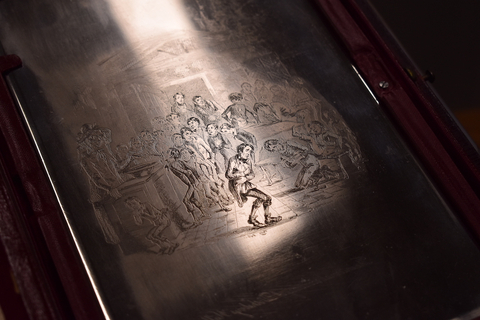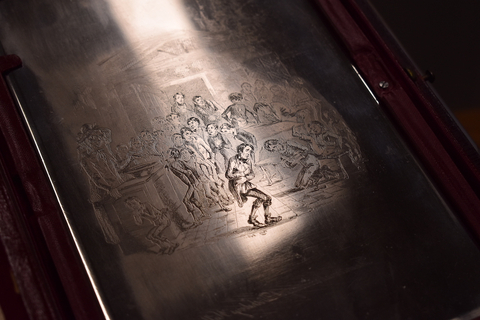WORCESTER, Mass.--(BUSINESS WIRE)--“The Life and Adventures of Nicholas Nickleby” may be one of Charles Dickens’s lesser-known works, but it is well-represented in WPI’s Fellman Dickens Collection, one of the richest collections of Dickens’s work and a premier resource for the region.
In fact, “Nicholas Nickleby” has its own shelf in the Fellman Dickens Reading Room at the university’s Gordon Library, and the collection includes the novel as it first appeared in serial form, along with an engraved steel plate used to print one of the original illustrations.
So when Joel J. Brattin, professor of Humanities & Arts at WPI and resident Dickens scholar, was invited to co-edit a recently published two-volume edition of “Nicholas Nickleby” for Oxford University Press, he had a good place to start.
The novel follows the adventures of its namesake, a young hero who finds himself working at a school notorious for the cruel treatment of its pupils. Brattin said Dickens was truly finding his voice when he wrote “Nickleby,” which, like many of Dickens’s works, was initially published in serial form in 32-page installments.
“His social conscience is fully engaged, and his criticisms of personal and institutional cruelties are powerful,” Brattin said. “This is also his first novel to have a young man who must work for a living as his hero.”
Brattin’s work with Oxford University Press on the novel stretches back eight years, and one of his co-editors, Elizabeth James, had been working on “Nicholas Nickleby” years before that. He said the process involves poring over manuscripts and other original documents to look for clues about how Dickens originally intended the novel to be understood. The new volumes will serve as the gold standard Dickens scholars will turn to when examining the work.
“Essentially you’re presenting how Dickens would have wanted the novel to appear to his original readers–what Dickens understood the novel to be when he wrote it in 1839,” Brattin said. “It feels a bit like you’re peeking over his shoulder—you see he’s trying to sharpen this bit here, and over there he’s making a joke, and refining it if he thinks it doesn’t work.”
Brattin said Dickens’s sense of inventiveness and his keen observations run throughout “Nicholas Nickleby,” and that the novel’s appeal lasts to this day.
“The novel is, first of all, very funny,” Brattin said. “But, also, we are still the same sorts of human beings among whom Dickens lived, and about whom he so brilliantly wrote. Dickens sees the world clearly, loves it, and wants to make it, himself, and us, better.”
Brattin, who has helped guide the Project Boz initiative at WPI to digitize Dickens’s novels in the serial format in which they were originally released, said the new Oxford University Press volumes are aimed primarily for an academic audience, but noted that a paperback edition for casual reading is also planned.




